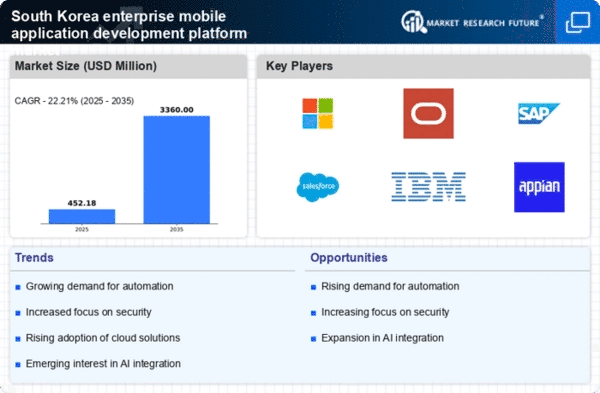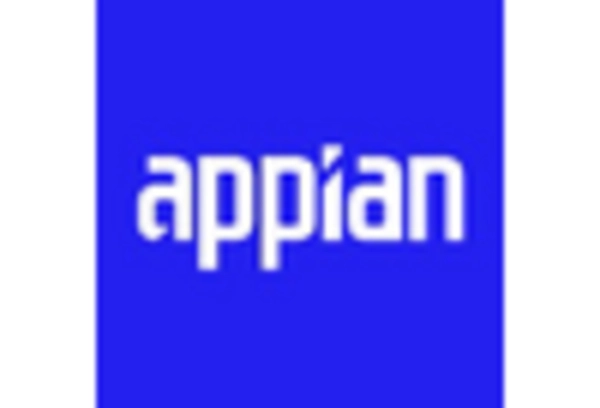Rising Mobile Workforce
the enterprise mobile-application-development-platform market is experiencing significant growth due to the increasing number of mobile workers in South Korea. As organizations embrace remote and flexible work arrangements, the demand for mobile applications that facilitate communication, collaboration, and productivity has escalated. According to recent data, approximately 40% of the workforce in South Korea is now engaged in mobile work, which necessitates robust mobile solutions. This trend compels enterprises to invest in mobile application development platforms that can support a diverse range of devices and operating systems, ensuring seamless access to corporate resources. Consequently, the enterprise mobile-application-development-platform market is likely to expand as businesses seek to enhance employee engagement and operational efficiency through mobile technology.
Emergence of 5G Technology
the enterprise mobile-application-development-platform market is set to undergo significant changes with the emergence of 5G technology in South Korea. The rollout of 5G networks is expected to significantly enhance mobile connectivity, enabling faster data transfer and improved application performance. This technological advancement opens new avenues for mobile application development, allowing enterprises to create more sophisticated and data-intensive applications. As 5G technology becomes more widespread, businesses are likely to leverage its capabilities to enhance user experiences and operational efficiency. The enterprise mobile-application-development-platform market is thus expected to benefit from this technological shift, as companies seek to capitalize on the advantages offered by 5G connectivity.
Growing Consumer Expectations
the enterprise mobile-application-development-platform market is shaped by the rising expectations of consumers in South Korea for seamless and engaging mobile experiences. As users become accustomed to high-quality applications in their personal lives, they increasingly demand similar standards from enterprise solutions. This shift in consumer behavior compels businesses to invest in mobile application development platforms that can deliver user-friendly interfaces, fast performance, and robust functionality. Data suggests that 75% of users are likely to abandon an application if it does not meet their expectations. Consequently, enterprises are motivated to enhance their mobile offerings, driving growth in the enterprise mobile-application-development-platform market as they strive to meet and exceed consumer demands.
Government Initiatives and Support
The enterprise mobile-application-development-platform market is benefiting from various government initiatives aimed at promoting digital transformation in South Korea. The government has launched several programs to encourage the adoption of advanced technologies, including mobile application development. For instance, funding and grants are available for businesses that invest in innovative mobile solutions. This support is crucial, as it lowers the financial barriers for enterprises looking to enhance their mobile capabilities. Furthermore, the government's focus on fostering a tech-savvy workforce through education and training programs is expected to bolster the talent pool available for mobile application development. As a result, the enterprise mobile-application-development-platform market is poised for growth, driven by these supportive measures.
Increased Investment in Digital Transformation
the enterprise mobile-application-development-platform market is witnessing a significant increase in investment as organizations in South Korea prioritize digital transformation. Businesses are increasingly recognizing the need to modernize their operations and enhance customer experiences through mobile applications. Recent statistics indicate that over 60% of enterprises in South Korea have allocated substantial budgets for digital initiatives, with a considerable portion directed towards mobile application development. This trend reflects a broader shift towards leveraging technology to improve efficiency and competitiveness. As companies seek to create innovative mobile solutions, the enterprise mobile-application-development-platform market is likely to thrive, driven by this influx of investment and the demand for cutting-edge applications.
















